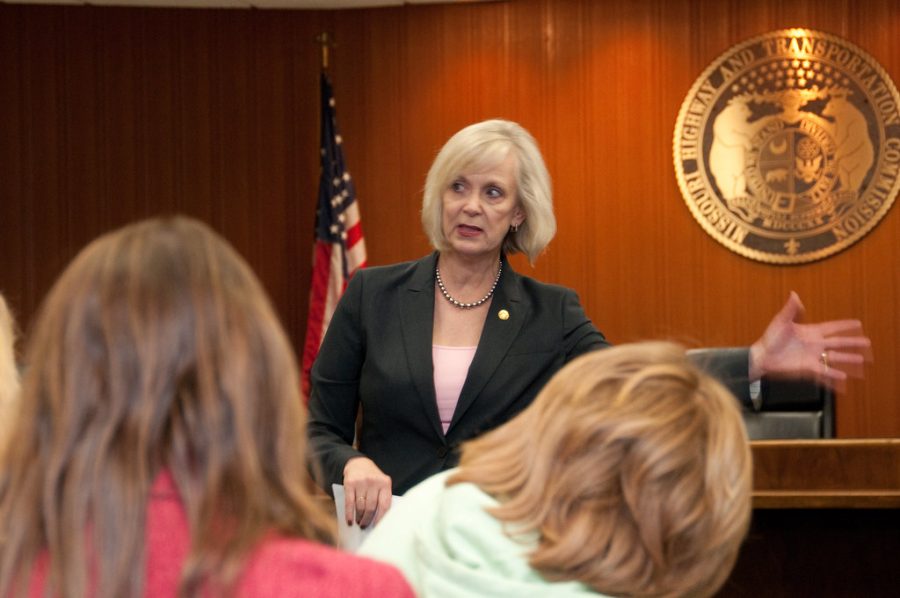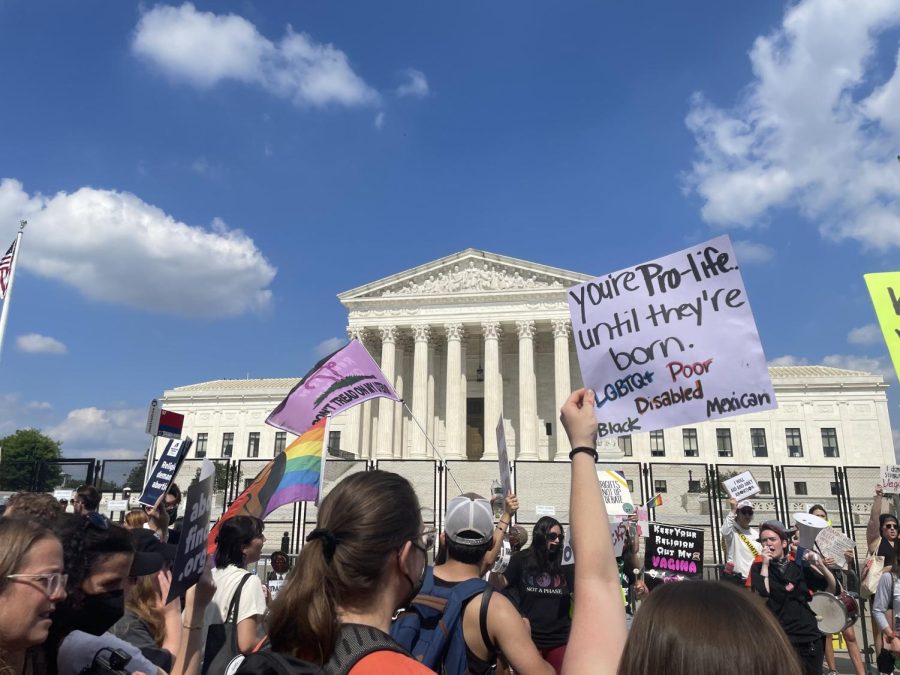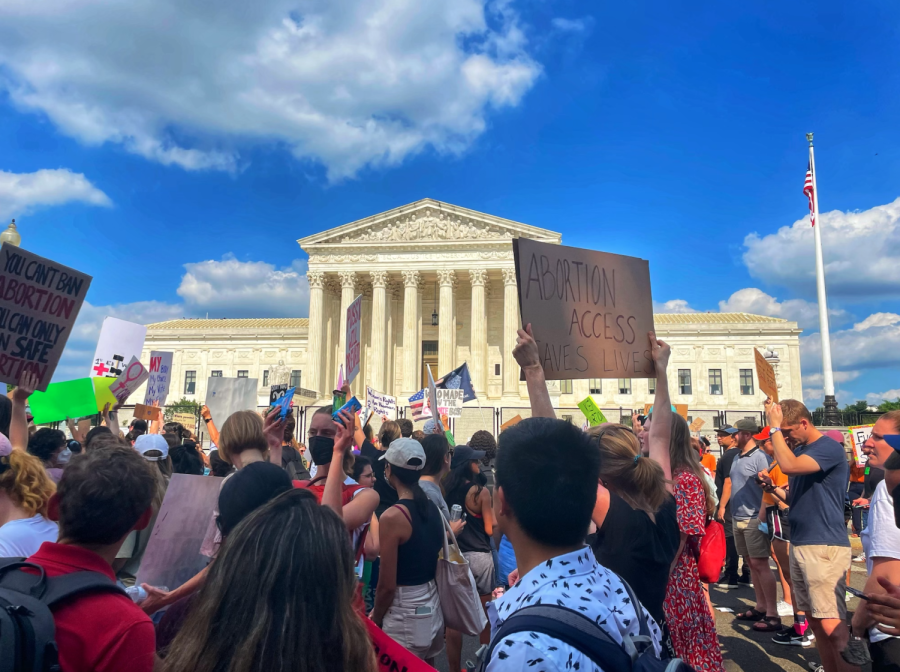On Oct. 27, The Hustler spoke with former Missouri Democratic representative Honorable Stacey Newman about reproductive rights, life as a journalist and a politician and students’ civic responsibilities.
Newman served in the House of Representatives from 2009 to 2019 and founded Progress Women. Her policy primarily focuses on reproductive rights, gun laws and voting rights.
As a speaker for a Nov. 2 panel titled “Pandemic America: Where the &$@! are we heading?” hosted by the Department of Medicine, Health and Society, Newman will speak on the future of women’s reproductive rights in a post-pandemic world.
The Hustler: How do you balance your journalistic career with your career in the public sector? Do you find that you have to refrain from writing about certain topics to preserve your credibility in the public sector?
Newman: Well, actually just the opposite. I don’t know if you know much about my background, but I served in our State House for nine years until I was termed out—I served from 2010 through 2018. My policy focus was on reproductive rights, gun violence and voting rights. I’m a Democrat and I also knew that that was the Republican party’s main agenda, particularly when it came to election time. I’ve been working on gun violence for like 20 years. So that was my background in terms of policy.
I represented a district in suburban St. Louis that includes Washington University. It’s a long-time, very progressive district. It has a reputation, until recently, of being represented by pretty activist progressive women. So there was sort of a model there. I also knew that my district expected me to be a leader and I also knew that they would support me.
I had two very contentious elections. The more I’ve learned about the legislative process, that’s what I personally look for. I want somebody to get right in there, regardless if it’s popular, but fight and do the right things. So when it comes to writing, and being a journalist—that’s funny, I don’t always consider myself that but I do. That’s my background in these progressive issues. That’s where my voice has been known even before I ran for office. So I look at it the other way around. I look at the fact that you have a responsibility, particularly when you know things are wrong or are right. Not that you should have to pull up every issue, but those three issues I mentioned are very high in terms of what the public thinks. If you were doing something that didn’t have much support, you’d start to maybe wonder or doubt yourself. But no, I feel the opposite. I feel like if you know that this is in your heart the right thing to do and the right thing to say, regardless if anyone else is willing to do it, you should talk about it.
I have been doing some writing for the last year and going back through my tenure in the legislature and looking at St. Louis and Missouri, which was really the birthplace of the Tea Party which led to Trumpism. I saw it all from the beginning; I saw the changes; I saw the attitudes and, to me, that’s a sign of strength and it’s also a sign of respect if you’re willing to stand up, regardless of what the peer pressure is, when you know it is the right thing to do. I think that’s when people appreciate the leader. So I think I think that’s a much more important quality than then worried about maybe dancing around the edges
Given your work in the public sector and as a writer, your life is often put on public display. How do you draw the line, if at all, as to what to reveal to the public or how do you keep an air of privacy in your life?
Well, I think when you go into this line of work, you should expect that your life isn’t private. I mean, you’re not up there talking about your personal life, day in and day out. But if you’re running for office, people want to know a little bit about your family.
I use writing as basically a tool that I have, particularly once I was elected to office. I first ran in 2008 and I lost. This was back when we had really decent campaign finance limits and I lost to someone who completely ignored those finance limits. I just couldn’t run against unlimited money using my family’s money. So then I was elected the following year when the guy that beat me actually became a felon; he got booted out of office.
I was sworn in basically halfway through the two-year term and I was sitting in my first session by myself thinking, “what tools do I have?” Obviously, I knew my district needed to know me better since I had just gotten sworn in. I hadn’t been able to cast votes, you know, even in committee. I knew that obviously 2010 was a number election year, and I knew that I had to get my district to know me better. They had to know what was going on inside the Capitol. I just basically felt like I had the responsibility to clear the room.
That’s really when I made a focused effort on writing more, particularly with a biweekly newsletter about what was going on. At that point, I was running my third race in three years. I wanted them to know me. There wasn’t anything that I felt like I needed to shield my voters from. When you’re running for office, you capitalize on all of the connections that your family has. This is where I first thought about the privacy thing, and I know people are starting to think about it more.
I think you have to stop and think when you get into this line of work, whether it’s any kind of public policy, whether you’re writing or whether you’re legislating. I think you have to stop and redefine what privacy means to you. Because it is public policy, after all.
I was elected in a purple state that has become completely red. When you’re arguing on the floor in the minority, you’re trying to think of every angle that you can think of, every argument you can think of, and there really aren’t any new arguments to some of these issues. I mean, there’s nothing laying there that’s never been tried.
I also know that the average person is not listening to the proceedings. The thing that I was always cognizant of, in our State House, the press gallery was up on the third floor. They were always there, and their job was to cover what was happening. Sometimes our debate was actually geared towards them. Not that you’re trying to land speech bombs or anything. It was more, “what else can I say that will wake people up; what else can I say?” I remember in my first debate I told a personal story, and I sat down and thought, “was that appropriate for me to do?” But once I opened my mouth and started talking, I wasn’t afraid that I was going to say anything that was gonna be embarrassing. I was passionate and told a personal story that related to the bill. It was another way to get people to listen.
When I came in, there were five of us that were Jewish. We’re all from the same suburban areas of St. Louis. When I left, I was the only one. As you can imagine, with the rise of Trumpism, anti-Semitism has also risen. It has also been freer for people to bring up either the Jews or the Holocaust or something during a floor debate that had obviously nothing to do with any of that. Just as a way to get people to stop, sometimes I would tell some personal stories. My husband’s family are Holocaust survivors and I know that there are still lots of people that have never met a Holocaust survivor. We don’t have many left. So I felt that family stories were vital for lots of reasons, if not just to get them to stop. I had a few people come up and thank me for mentioning that because they never knew much about it.
If it’s a personal story that can help you make your point, you’re not doing anything to embarrass yourself. If you have a private life that you’re embarrassed about, maybe you need to rethink your profession.
What is it like being a Democrat representative in a red, Southern state?
Well, it’s hard. I mean, I knew that going in—I had worked around the State House since 2001. It is very hard to be in the minority. But it’s also hard being the majority. The more opinions you have, the more internal arguments and internal disagreements you have, and you learn that really quickly when Republicans are going after Republicans on the floor. You just learn really quickly to just be quiet.
I think the other thing that helped me when I was elected was that I had been around the Capitol and had lobbied as a citizen for a number of years. I also worked for the state party. I’ve been on the campaign side a lot. I had also done a lot of work with the public in terms of campaigning, door knocking and working with predominantly women’s groups.
I’ve had people ask me, “do you regret or do you miss being there?” And it depends on the hour. There were some times where I was totally unprepared for being the maddest I have ever been in my entire life. I was surprised by the emotion that I felt.
I knew once I was elected I was going into a minority, which became a super minority. My role was to play drums. My role there was not to pass bills. Most of my colleagues couldn’t grasp that. I knew I had to play a lot of defense, and I was gonna be playing defense almost the entire time. Ask somebody who’s on defense for an athletic team. Yes, it’s hard. But that’s your job. That’s your role. Your win is when you defeat something. It’s not about how many bills you get to the governor’s desk. Doesn’t matter if your governor’s your party. Since I knew that going in, and I knew what the lay of the land was, I felt like I had to do that as best I could.
Vanderbilt students, including myself, only know a world with Roe v. Wade intact. What was life like before this ruling, and if it were to be overturned, do you think that American life would return to how it was before the ruling, or would it be better or worse?
Well, it’s gonna be worse than it is now, let’s put it that way. There’s no question about it. I actually graduated high school the year before Roe was enacted. People then got married much earlier than they do now and started families.
In 1972, when I graduated high school, it was also the first year that they allowed 18-year-olds to vote in the presidential election, and I was completely just thrilled. There were other things, though, that I couldn’t do, and birth control wasn’t even quite legal for single women yet. The pill was still fairly new then; it wasn’t over the counter.
There were some of us that really wanted to make something of our opportunity to go to college and have a career and do all those things that we all take for granted now. As a woman, you couldn’t get a credit card without your husband’s name. You always had to have a man sign for you to make it count. Things were very sexist and much more straightforward. You knew it was wrong, but you didn’t know how to change things.
Before Roe, I personally didn’t know anybody that got an abortion, but my husband did. He was a couple of years older in college. I’ve gone back the last couple of years and just tried to find people who were either practicing medicine before ‘73. Back then, many women felt like they had to keep things private. People weren’t as free with talking about sexuality or dating, etc. So everything was very under the table. You had to kind of know people. I really tried to get some of those stories out and I’ve talked to a couple of doctors in the last couple of years since I left office. These doctors are now in their 80s and it’s really hard to find people who can talk coherently or who can remember.
It’s hard to imagine the desperation of being pregnant against your will or unintended or having a pregnancy that’s gone wrong and you’re being forced to carry the baby to birth, basically against your will. When you ask about what things will go back to, there’ll be a lot of what we’re seeing in Texas where people can turn you in, where there’s a bounty on your head. There’s a bounty on physicians even though this is what they are trained to do. It’s a legal medical procedure. Things will be driven, more underground because the desperation is going to stay there. Mainly abortion. If you go back and look at the history of abortion, it’s always been there. If a person didn’t want to be pregnant, they would go to any means for it to not be a problem. I can’t watch “The Handmaid’s Tale” because I’ve lived it in my state. I don’t need to see this. People have told me that my body is not mine, or I don’t know what I’m talking about.
One of the nice things about being Jewish is that, in the Jewish faith, the woman is first. Trying to explain that to someone who’s an evangelical is hard. The other side has really used the whole baby-killing thing to an extreme when it’s always been about the mother. I just know things are going down a really dark path. Desperation will continue and we’ll do things that are unsafe because we have to.
What do you think the biggest challenge is in the fight to uphold Roe v. Wade?
Well, obviously right now the biggest challenge is the courts since we already have certain judges in place because people didn’t pay attention in the last decades to who they were electing to appoint those judges. It’s very hard to get rid of a federal judge. It’s very hard to get rid of any Supreme Court judge. We’re sort of stuck. These are things we’ve been yelling about for a long time. Most of this really rested on the shoulders of voters.
I think you use every tool that we have, which is yelling and screaming and trying to get more people to make this [abortion] an issue. We’ve come a long way. In 2016, when Hillary Clinton was talking about reproductive rights on the campaign trail, that was a first. Every single Democrat candidate, regardless of where you are, needs to be yelling about this when that right to privacy, when that right to control your own body, is hanging by a thread by a conservative Supreme Court.
It’s hard to know what’s left to do. I mean, you’re asking him a billion-dollar question. We’ve talked about it for years, but now everything is contingent on presidential elections and who we put into office. All I know is it’s not going to be good. Your big question is what’s going to happen to democracy when some of this stuff really starts? I mean, we’re close, when the rule of law means nothing when the Supreme Court means nothing.
It’s not just reproductive rights. It’s the fact that physicians shouldn’t be jailed because they’re practicing legal medicine that they’ve been trained to do. There are so many ramifications to this and I think it could be the responsibility of journalists to write about the things that inform more people about the power that we all have in showing up to vote.
We’ve been seeing this coming to fruition for the last 10 years in terms of trying to elect really conservative Tea Party people to basically throw out teachers, to throw out curriculums, to throw out textbooks. None of this is new, but there’s no say concentrated strategy.
For college students, you don’t know where you’re going to settle down or where you’re going to live for the next five years. So how do you get invested in your local community? How do you relate to who the state representative is that oversees you in college?
College kids can overthrow or determine a State House election. You’re going to be having elections next spring for your State House, for the one where you guys reside right now. If it’s somebody that you agree with, you could help them stay in office. If it’s somebody you don’t agree with, you could fight against them. You have power where you are right now. Don’t worry about where you’re gonna be in five years. You guys have the numbers. You’re sitting on a pile of people. Whether it be writing, whether it be working for a candidate, whether it be trying to get people to vote, you have a responsibility to do that.
This piece has been edited for length and clarity.



















